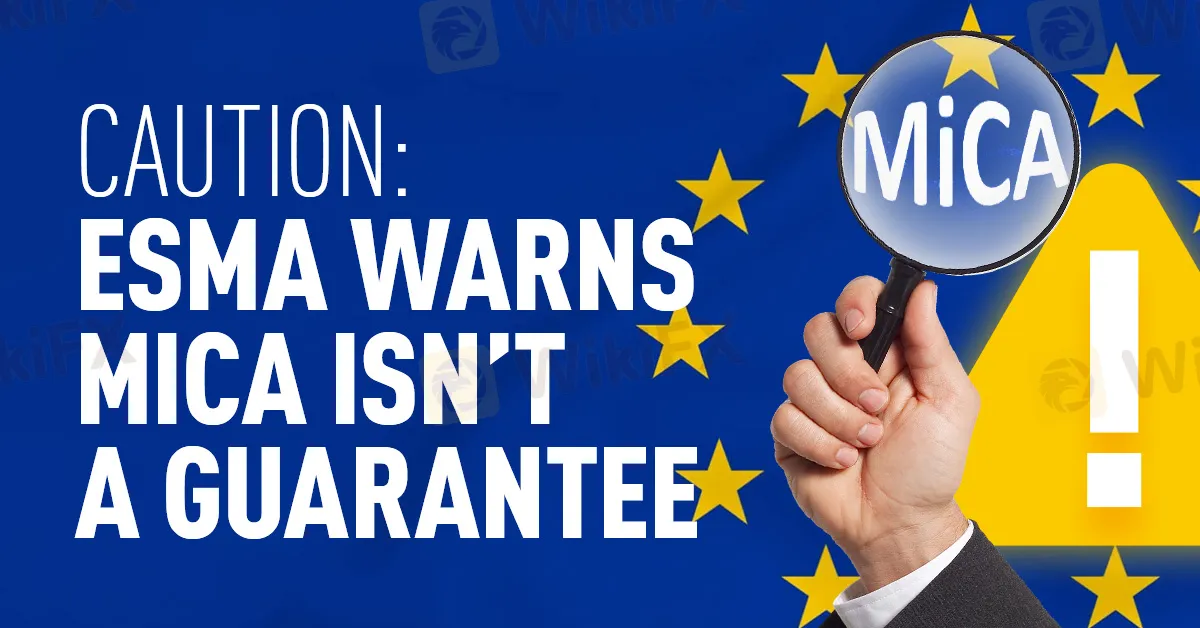简体中文
繁體中文
English
Pусский
日本語
ภาษาไทย
Tiếng Việt
Bahasa Indonesia
Español
हिन्दी
Filippiiniläinen
Français
Deutsch
Português
Türkçe
한국어
العربية
Caution: ESMA Warns MiCA Isn’t a Guarantee
Abstract:ESMA's MiCA regulation, effective June 2023, aims to regulate and enhance oversight in the cryptocurrency industry, collaborating with European authorities. It results in a significant decline in crypto fraud but a rise in payment sector fraud, cautioning protection for crypto retail traders by December 2024.

The impending enforcement of the Markets in Crypto-Assets (MiCA) regulation by the European Securities and Markets Authority (ESMA) signifies a significant stride towards enhanced oversight of digital assets. Set to take effect in June 2023, MiCA introduces a comprehensive plan devised by the regulator to address crypto-related risks and establish a regulatory framework for the digital asset domain.
In collaboration with the European Banking Authority, the European Insurance and Occupational Pensions Authority, and the European Central Bank, ESMA is actively engaged in a public consultation process to fine-tune the regulatory approach. The MiCA, unfolding over 12 to 18 months, encompasses three levels of implementation, with the ESMA introducing a series of technical standards through three distinct packages.

These measures, covering authorization, governance, conflict resolution, and complaint-handling procedures, lay the groundwork for a robust regulatory architecture aimed at bolstering the crypto ecosystem. The initial package, slated for launch in July 2023, delves into the specifics of mandates such as notification content, application for authorization, and complaint-handling procedures.
Subsequent packages, scheduled for October 2023 and Q1 2024, progressively address critical mandates, contributing to the comprehensive regulation of crypto-assets. As the ESMA's consultation process unfolds, stakeholders eagerly anticipate the clarity and certainty that MiCA is poised to bring to the market.
The cryptocurrency industry is on the brink of a transformative era, with a heightened focus on sustainability indicators, business continuity, trade transparency, and investor protection. Amid the evolving regulatory landscape, investors, businesses, and regulators alike must navigate these changes to ensure a secure and compliant future for crypto-assets in the European market.
A notable development has been the substantial decline of 51% in crypto fraud last year, attributed to the impact of the MiCA regulation. According to a report by AU10TIX, these regulations have not only suppressed illicit activities within the crypto space but have also shifted the attention of cybercriminals towards the payments sector.
While MiCA continues to fortify the crypto market against fraudulent activities, its repercussions are evident in the payments sector, where there was a notable 56% increase in reported fraud cases last year. Despite the positive impact on crypto fraud, the ESMA cautions that the regulations will not extend protection to crypto retail traders until December 2024.

Disclaimer:
The views in this article only represent the author's personal views, and do not constitute investment advice on this platform. This platform does not guarantee the accuracy, completeness and timeliness of the information in the article, and will not be liable for any loss caused by the use of or reliance on the information in the article.
Read more

Gigamax Scam: Tracking Key Suspects in RM7 Million Crypto Fraud
Malaysian authorities are actively pursuing seven individuals linked to the Gigamax investment scam, which has defrauded investors of over RM7 million. The suspects include an Indonesian national, identified as Awaludin, who is believed to be the mastermind behind the scheme, and six Malaysians who served as promoters and speakers for the fraudulent operation.

Singaporean Arrested in Thailand for 22.4 Million Baht Crypto Scam
Thai authorities have apprehended a 32-year-old Singaporean man suspected of being part of a transnational syndicate involved in cryptocurrency scams. The group is accused of defrauding victims of more than 22.4 million baht (S$886,000) through a fraudulent trading platform.

Kraken and BitGo to Handle FTX Payouts Starting January 2025
Kraken and BitGo will oversee the first FTX payouts starting January 3, 2025. 98% of creditors receive at least 118% of their claims in cash.

FCA Seeks Input to Shape UK Crypto Market Regulations
UK FCA seeks public feedback on crypto rules to improve market transparency, protect consumers, and support growth. Comments are open until March 2025.
WikiFX Broker
Latest News
Geopolitical Events: What They Are & Their Impact?
Volkswagen agrees deal to avoid Germany plant closures
Top 10 Trading Indicators Every Forex Trader Should Know
TradingView Launches Liquidity Analysis Tool DEX Screener
MultiBank Group Wins Big at Traders Fair Hong Kong 2024
WikiEXPO Global Expert Interview: Simone Martin—— Exploring Financial Regulation Change
'Young investors make investment decisions impulsively to keep up with current trends' FCA Reveals
Why Do You Feel Scared During Trade Execution?
CySEC Settles Compliance Case with Fxview Operator Charlgate Ltd
Malaysian Influencer Detained in Taiwan Over Alleged Role in Fraud Scheme
Currency Calculator


